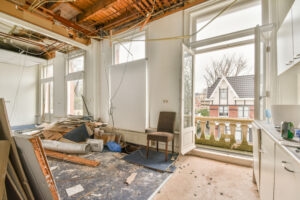Disrepair
A housing disrepair claim allows you to seek legal remedies when your rented property is in disrepair. You may file a claim if your landlord has failed to make necessary repairs, which can affect your health, safety, and overall well-being.
The process begins by first notifying your landlord about the disrepairs and giving them ample time to address them. If the landlord fails to take action, you can proceed with the pre-action process, which involves sending a letter before action outlining your grievances.
Housing Disrepair Claims
You might have the right to file a home disrepair suit in the County Court if your landlord ignores significant damage after being informed. In London, tenants are legally entitled to a safe, secure, and livable home, and landlords are continuously obligated to keep rental properties up to code.
Landlords are required by the Landlord and Tenant Act of 1985, the Homes (Fitness for Human Habitation) Act of 2018, and the Housing Health and Safety Rating System (HHSRS) to make sure the property is free of hazards like mold and dampness, leaks, dangerous electrical systems, structural flaws, insufficient heating, and pest infestations. Following the Awaab’s Law amendments, recent guidance has reinforced landlords’ obligations to remedy hazards, including mold and moisture, within stringent timelines.
Tenants who file a housing deterioration claim may be able to:
Demand that landlords make the required repairs.
Recover damages for discomfort, annoyance, and amenity loss.
When applicable, request a rent reduction or reimbursement.
Cases involving housing degradation can be legally complex and call for specialized understanding of housing laws, evidence collection techniques, and procedural guidelines. Our London housing disrepair lawyers offer knowledgeable counsel, draft court filings, communicate with environmental health agencies, and defend renters at every stage.
Our skilled London housing solicitors at Adam Bernard Solicitors are dedicated to upholding tenants’ rights, settling conflicts quickly, and obtaining the best result for your disrepair claim
What to do if You Have Housing Disrepairs?
If you face housing disrepair, it’s crucial to take action promptly. Start by contacting your landlord to report the issues and allow them to address them. Communicate the nature of the disrepair and its impact on your living conditions.
Allow your landlord a reasonable amount of time to do the necessary repairs. Keep a record of all correspondence, including dates, times, and details of your communication with your landlord. This documentation will be valuable evidence if you need to escalate the matter further.
If your landlord fails to respond or neglects to resolve the disrepairs within a reasonable timeframe, you can proceed with the pre-action process.
It involves sending a formal letter before action to your landlord, clearly outlining the disrepairs, the steps you have taken to report them, and the timeframe given for rectification.
Providing sufficient notice to your landlord is essential, allowing them one final opportunity to address the issues before initiating legal action.
If the disrepairs remain unresolved, you may need to file a claim in the county court. This step involves preparing the necessary documentation, including evidence of the disrepair, your attempts to contact your landlord, and any correspondence exchanged.
It is advisable to seek legal assistance from qualified housing solicitors at this stage to ensure that your claim is presented correctly.
Types of Disrepair Claims
Two main types of disrepair claims can arise based on the level of fault attributed to the landlord. Understanding these distinctions can help you navigate the legal process and determine the best approach for your situation.
- No-Fault Disrepair Claims: In these cases, the disrepair is solely the landlord’s responsibility. It means the disrepair exists due to the landlord’s failure to maintain and repair the property adequately. Examples include situations where the landlord has neglected their obligations to keep the property habitable.
- Partial Fault Disrepair Claims: These cases involve a combination of responsibilities between the tenant and the landlord. While the landlord may be liable for some aspects of the disrepair, the tenant’s actions or lack of reporting the issue may have contributed to the extent of the problem. For instance, if a tenant fails to report a leak, leading to more significant damage, their partial fault may be considered.
It’s important to note that even if you believe you may have contributed to the disrepair issue, it does not automatically absolve the landlord of their responsibility. You may still have a valid compensation claim, especially if the landlord’s negligence or failure to address the issue promptly aggravated the situation.
A housing disrepair solicitor can help you assess whether you are liable for any of the disrepairs or if it’s a no-fault claim.
Things Covered by Housing Disrepair Claims
A housing disrepair claim covers a wide range of issues. These can range from minor inconveniences to significant health and safety hazards.
Common examples of disrepairs that may qualify for a housing disrepair claim include the following:
- Damp and Mould: If your property suffers from dampness or mould growth due to inadequate ventilation or water leaks, it can lead to health problems such as respiratory issues and allergies.
- Structural Defects: This includes problems with the building’s structure, such as cracked walls, subsidence, or faulty roofing, which can compromise the safety and integrity of the property.
- Heating and Plumbing Issues: Insufficient heating, faulty boilers, leaking pipes, or lack of hot water are all examples of disrepairs that affect your comfort and basic amenities.
- Electrical Problems: Faulty wiring, inadequate electrical systems, or defective appliances pose risks of electrical shocks, fire hazards, and potential damage to your personal belongings.
- Pest Infestation: If your property suffers from a persistent infestation of pests, such as rodents, insects, or vermin, it can significantly impact your quality of life and pose health and sanitation concerns.
- Sanitation Issues: Problems with sanitation facilities like toilets, sinks, or drainage systems can lead to unhygienic conditions, foul odours, and potential health risks.
- Security and Safety: Lack of adequate locks, broken windows, or faulty security systems compromise the safety of your property, putting you at risk of burglary or personal harm.
In a housing disrepair claim, you may seek various forms of compensation, including repairs, financial compensation for damages or losses suffered, or even alternative accommodation during the repair period.
It’s important to note that each case is unique, and the specific circumstances of your disrepair claim will determine its strength and potential outcome. A housing disrepair solicitor can help you understand the merits of your claim, gather relevant evidence, and present a strong compensation case.
How to File a Housing Disrepair Claim for Compensation?
If you are experiencing housing disrepairs, you can seek compensation for the damages and inconvenience caused. Filing a housing disrepair claim can help you hold your landlord accountable and ensure that necessary repairs are done. Here are the steps to file a claim:
- Gather Evidence: Collect evidence of the disrepair and its impact on your living conditions. Take photographs or videos of the issues, keep records of any communication with the landlord regarding the repairs, and gather supporting documents, such as receipts for expenses incurred due to the disrepair.
- Notify Your Landlord: Inform your landlord in writing about the disrepairs and their impact on your living conditions. Provide a reasonable deadline for the repairs to be carried out, ensuring that you have given the landlord sufficient opportunity to address the issues.
- Pre-Action Protocol: If your landlord fails to respond or does not complete the necessary repairs within a reasonable time, you can initiate the pre-action protocol. It involves sending a formal letter before action, detailing the disrepairs, the impact on your daily life, and your intention to pursue legal action if the matter is not resolved.
- Seek Legal Advice: It is highly recommended to seek the assistance of a housing disrepair solicitor at this stage. Experienced lawyers can provide relevant legal advice and help you negotiate with your landlord to settle.
- File a Claim in Court: If a satisfactory resolution cannot be reached through negotiation, your solicitor can help you file a claim in the county court. This involves completing the necessary forms, providing supporting evidence, and paying court fees.
- Case Evaluation: The court will evaluate your case and schedule a hearing if necessary. It is crucial to provide all relevant evidence to support your claim during this stage.
- Compensation and Repairs: If your claim is successful, the court may award you compensation for the damages and inconvenience caused by the disrepairs. The court can also issue an order requiring the landlord to do the necessary repairs within a specified timeframe.
Remember, pursuing a housing disrepair claim can be complex, and having the support of a knowledgeable housing solicitor can significantly increase your chances of success.
Types of Compensation You Can Seek
When pursuing a housing disrepair claim, you have the right to seek various types of compensation for the damages and inconveniences caused by the disrepair. Here are the types of compensation you may be able to recover in your claim:
- General Damages: General damages compensate you for the pain, suffering, and loss of enjoyment you suffer due to the disrepair. This covers the physical discomfort, mental distress, and inconvenience you have experienced due to the substandard living conditions.
- Special Damages: Special damages help you recoup the financial losses you incurred due to the disrepair. This may include reimbursement for any expenses you have paid out-of-pocket for repairs, alternative accommodation costs if you had to relocate temporarily, and increased utility bills resulting from the disrepair.
- Compensation for Personal Belongings: If your personal belongings were damaged or destroyed due to disrepair, you may be entitled to compensation for repairing or replacing those items. Keep records, photographs, or receipts to support your compensation claim.
- Rent Rebate or Rent Reduction: In some cases, you may be eligible for a rent rebate or reduction for the period during which your property was in disrepair and uninhabitable. This aims to provide financial compensation for the reduced value of your tenancy due to the inadequate living conditions.
- Injunction or Specific Performance: The court may grant an injunction or order specific performance in certain situations. An injunction may require the landlord to do the necessary repairs within a specified timeframe. Specific performance can compel the landlord to fulfil their contractual obligations and provide you with a habitable and safe living environment.
It’s important to note that the types and amount of compensation you may be eligible to receive depend on the specific circumstances of your case.
How Can Our Housing Disrepair Claims Solicitors Help?
Navigating the process of housing disrepair claims can be complex and challenging. That’s where our experienced housing disrepair claims solicitors can provide invaluable assistance and support.
Here at the London-based Adam Bernard’s law firm, our housing solicitors have in-depth knowledge of the legal complexities involved. They can guide you through the entire process, explain your rights, asses the strength of your claim, and advise you on the best course of action.
Our solicitors can also skillfully represent your interests during these negotiations, advocating for fair compensation and ensuring your voice is heard.
Contact us today to discuss your housing disrepair claim with our solicitors.
Common Mistakes Tenants Make in Housing Disrepair
-
Failing to report disrepair to the landlord in writing
-
Not keeping evidence (photos, videos, medical records, messages)
-
Allowing disrepair to worsen before taking action
-
Not giving the landlord reasonable time to carry out repairs
-
Skipping the pre-action protocol / letter before action
-
Stopping rent payments without legal advice
-
Accepting temporary or poor-quality repairs
-
Delaying advice from housing disrepair solicitors in London
Why Clients Trust Us – How Adam Bernard Solicitors Can Help
-
We are specialist housing solicitors in London with extensive experience in disrepair, eviction, and tenant rights cases
-
We provide clear, honest legal advice from the outset so clients fully understand their options
-
We act quickly and proactively, preventing landlords from delaying or ignoring their legal duties
-
We handle the entire process, from pre-action letters to County Court claims, reducing stress for clients
-
We focus on maximising compensation while ensuring repairs are carried out properly
-
We offer flexible fee structures, making expert legal help accessible
-
We maintain regular communication, keeping clients informed at every stage
-
We have a proven track record of successful outcomes for tenants across UK
How Adam Bernard Solicitors Can Help
-
Assess your case and confirm whether you have a strong housing disrepair or eviction defence claim
-
Gather and prepare evidence to support your claim
-
Communicate directly with landlords, agents, and councils on your behalf
-
Draft and submit all legal documents accurately and on time
-
Represent you confidently in County Court hearings
-
Protect you from retaliatory eviction or unlawful landlord conduct
Frequently Asked Questions
A housing disrepair claim allows tenants to take legal action against landlords who fail to carry out essential repairs, such as damp, mould, heating, plumbing, or structural issues, under UK housing law.
If your landlord ignores repair requests, harasses you, enters the property without notice, cuts off utilities, or tries to evict you without a court order, they may be acting unlawfully.
Yes. Tenants may claim compensation for discomfort, health issues, damage to belongings, increased bills, and loss of enjoyment of the property.
You should report the disrepair in writing, keep evidence, allow reasonable time for repairs, and follow the pre-action protocol before starting a County Court claim.
No. Retaliatory eviction is unlawful in many cases. Housing solicitors in London can help challenge unfair Section 21 or Section 8 eviction notices.
Landlord harassment includes threats, intimidation, cutting off utilities, constant contact, unlawful entry, or forcing a tenant to leave without legal process
While not mandatory, using experienced housing solicitors in London greatly improves your chances of success and helps avoid costly legal mistakes.
Adam Bernard Solicitors provide expert advice, handle housing disrepair claims, defend eviction proceedings, stop landlord harassment, and fight for compensation and tenant rights across UK






